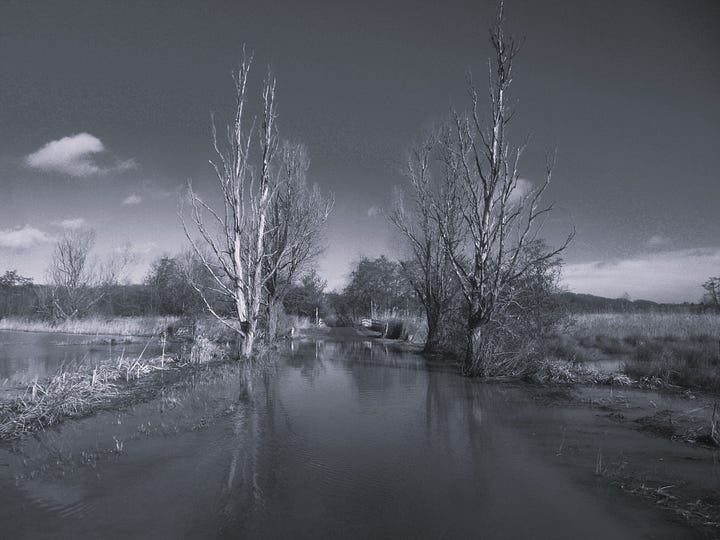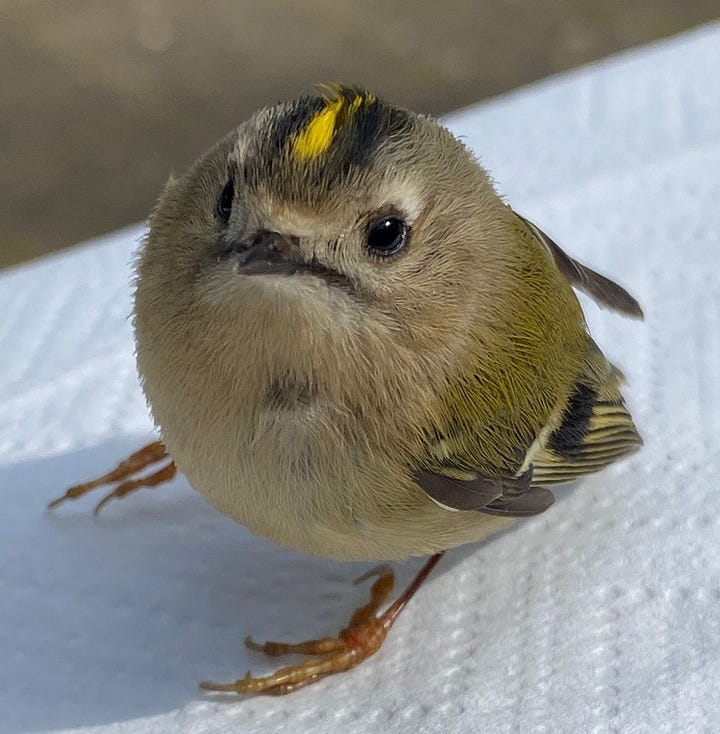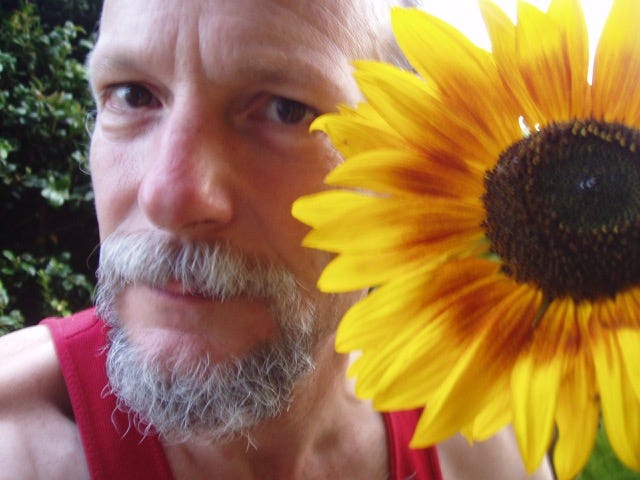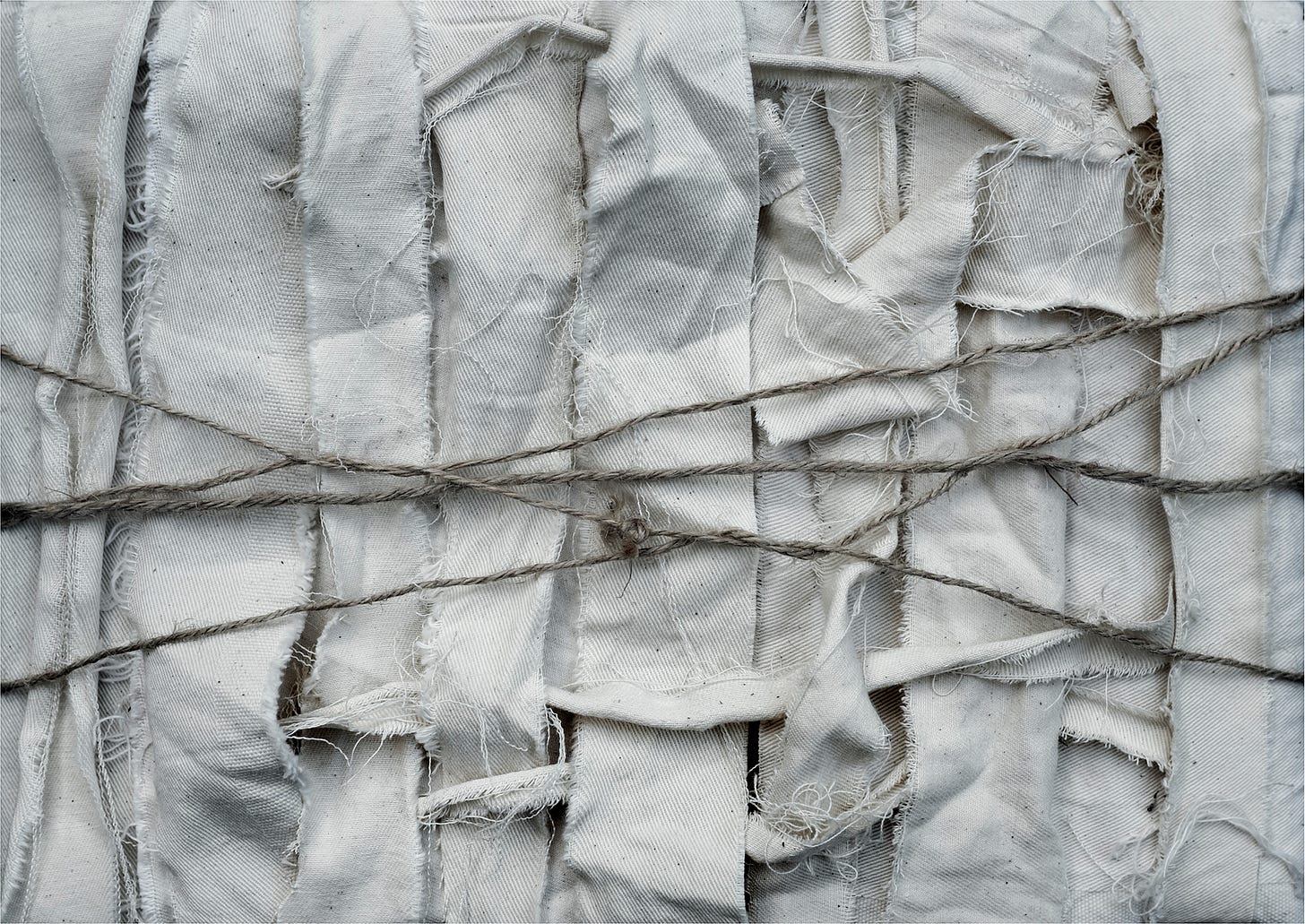Hello readers and writers, This is the second post in the occasional series, The Uneasy Chair, on writing as a metaphysical practice. In future posts, I hope to share tips and exercises from classes I’ve given over the years. Today’s is a short piece about its existential territory, written in the wake of my partner Mark Watson’s burial last month.
'Oh!’ thought Clarissa, ‘in the middle of my party here's death’.
(from Mrs Dalloway, Virginia Woolf)
Whatever wind blows, while they and I have leaves
We cannot other than an aspen be
That ceaselessly, unreasonably grieves,
Or so men think who like a different tree.
(The Aspens by Edward Thomas)
It’s the edge of a grey spring afternoon on the edge of England. I’m eating an ice cream on a tearoom terrace, looking over at an empty table where Mark, Simon and I sat last summer, on a day so warm and sunny even the men went into the sparkling sea for a swim. I don’t like the feeling of this National Trust tea room, its quiet restraint, its flatness, the way you feel corralled into linear time, where a memory of the heart can become a treacherous nostalgia.
Sometimes in these kinds of frequency you have to stay with the trouble, and sometimes you have to get up and do something different. Make a move that breaks its hold.
‘I’m going down to the beach.’ I say to Carrie who has just brought a pot of tea on a tray. ‘I’ll come and find you,’ she says.
So I go down the cliff path, and lie down by a seakale, now fast rising in their green wavy leaves all the way down the shingle shore. As I gaze into the windy sky, I see a whirl of sand martins, swooping and swerving above me, just arrived after their long haul flight from Africa.
‘Oh, you are back!’ I cry in delight, as they gather excitedly about the cliff, where their nests will soon fill the holes in the cliff face, like an ancient pueblo settlement.
The sea is deceptively calm. ‘Watch for the swells,’ I tell Carrie as she goes into the cold water. When she emerges her body strains against the tug of the undertow, that hidden force that drags you ever backward into the ocean’s salty embrace.
In the heathland tearoom above us you never feel that tug of the tides, but they are always there, slowly eroding the foundations of your carefully curated life.
Writers are the ones who remind you.
Nigredo
In the introduction to this Red Tent strand, I wrote that people write for many reasons: to be noticed, to offload their sorrows and fury about the world, to reflect on and record certain events. But the one we focus on here, as people sensitive to the mysterious nature of the planet and ourselves, is the desire to communicate what others might not see their ordinary lives. Words that might lead us out of a conventional world and down to the shoreline, to experience the tension between the pull and push of the sea, between life and death, and find an awareness that makes sense of everything. If we are metaphysical writers, we have to know that creative work really only comes out of this intertidal zone, and the desire to give back to the world, our daily struggles in this invisible territory, are what liberates us from its grip.
There are writers, of course, who wish to linger at the ghost tables, to write of the intricate lives of the holidaymakers, or the women standing at the counter. But none of their words will access the realms where the business of transformation happens.
Even as Mark was making everyone laugh, that pull and push zone was always there. In the Underworld dream of St John’s Wort, the sun might appear in the door, but you still felt the disturbance as your soul sensed its entrapment in the shopping malls of the world, the control room of the mind. The exit from these Hadean places is hard and the ones who show the way are often ignored, laughed at, or sometimes even sacrificed, like the pharmakon, as an appeasement: Edward Thomas in the trenches of the Great War; Virginia Woolf in a Sussex river in its wake. Writers, those who face the sea, need a nimble god at their side to pull them from the waves. when its force gets too strong.
Mercury, the winged god, takes you by the hand to the cliff edge, and shows you the eternity of the ocean. He is the god of writers because he will guide you across dimensions, and brings the winds of change into every stuck place. He takes you out of the tearoom and puts you in touch with the vegetable kingdom, the doughty brassica at your feet, and allows your imagination to take flight. It is an uneasy alliance, because he also leads you into the swell, so you might encounter your own fleeting nature. When he beckons at the crossroads, we avert our gaze: we would rather stay with what we know, our teatimes and holidays, and not confront our existential terror.
And yet, this move would take you into the first stage of alchemy, sometime known as the nigredo, the tide that pushes all the unseen flotsam and jetsam of your life out onto the shore to be seen and transformed. It is an opening for the change you say you want. What you need then is your courage, the power of the heart, to know what you have always known. That death would one day come to the party. It was just a question of time.
Carrie learned to wild swim in the icy lakes of Finland where silence and endurance are expected, so there is no gasp or shriek as she slips into the cold water. Its medicine, like grief, is understood. She lost her own partner three years ago, so there is another kinship between us now on this shore. We stand beneath the stars on a windless night in the garden, and smoke tobacco.
‘Some days I feel him close’, she says, ‘And some days not’.
The Zone


Once in our travelling years, when we were trying to find a home in Europe, we went with Cyril into the mountains above Nice, and stayed in a village gite. It was a winter’s night, bone-cold in the way only mountain places can be, and we climbed into bed to keep warm. Someone had left a video of the film Stalker in the room, so we watched it. It is probably the film I will most remember seeing in my life, though I have never watched it again. Its director, Andrei Tarkovsky, is a master creator of existential landscapes – the haunted grasslands and birch forests of Russia, its depleted industrial cities – places that describe an inner territory that feels both like the end of the world, and a moment you can start again from.
The soul needs to encounter a landscape to understand itself, to reflect its tumbled journey through this Earth, a transformation it is pledged to undergo. Sometimes you find it down by the flooded waterlands where you live, or in a book or film where your imagination can take flight. This visionary work struck me because it depicts so brilliantly the metaphysical writer’s dilemma. Until I saw Stalker, I imagined that the only depictions of the Underworld could be ancient ones, ushered by a winged god and bounded by dark rivers. When I was trying to write about the loss of a land and people I once loved, this scene from Stalker came back to me:
‘A man and woman and their crippled daughter sit at the end of the world in an empty apartment, as the seeds of the poplar trees from the Russian countryside drift through the windows with all the quietude of snowflakes. The man is silent: he is the stalker, the one who crosses the line, the one who opens the door. He had taken two men, a writer and a scientist, across the city’s well-guarded border into the Zone, a land where things are not what they seem. The territory has been revealed because of an apocalypse that has befallen the world. He had guided the men to a mysterious Room where you could ask for any wish to be granted, but they had stopped before the door and given all the reasons why they should not enter. He despairs. Who will go into the Room? What is the point of knowing the way if no one chooses to know themselves? How will the world turn around?’ (from ‘Cottonwood’, 52 Flowers That Shook My World)
Now I realise that one of the reasons the Writer and Scientist do not step inside the Room with those kinds of questions is that a death is required to ask them. Not necessarily your own physical death, but the death of the self you knew.
We loved Stalker, these films we watched for decades, because their imaginal territories gave us access to the soul work we did together. Because even though Mark was full of light, he loved the dark too; he loved all the poison plants, belladonna and wormwood, English graveyards and Mexican skulls, the sombre music of Arvo Pärt and the poem Stevie Smith wrote near the end of her life. Black March.
‘I feel I am empty inside,’ he said to me the week before he died, ‘as if there is nothing there.’ And perhaps that is how all great performers and alchemists go, when there is nothing left to give, except perhaps your own dramatic death that would shake us all to the core.
I am a breath
Of fresh air for you, a change
By and by.


Presence
Mark often said that people ‘don’t listen to what I have to say’. He did of course have things to say, but his listeners were more interested the way he said them, his presence, his colourful show, his formidable attention on their shared moment. This is how he was remembered. Joyful, kind, funny, someone who made you feel at home. Not many human beings can probably say that of their own presence. It takes a lot of heart and endurance to be like that.
Heart is the hardest thing to get right in a piece of writing, but it is its strongest medicine. The heart can bear all things. It can cope with paradox, chaos, poignancy, loss, failure, and most of all, time – this Earth’s great challenge. And we need heart, not just our smart alec minds and savage wills, because human experience is a tough gig. Life is not safe or easy. One day you get told to leave a place you love, one day you enter the house and your partner is lying on the kitchen floor, unable to move. One day you realise there is no one on Earth who will cherish you again. One day you find yourself in a tearoom and feel your heart will broken forever.
Heartbreak is what creates relationship with the reader. It takes your personal sorrow and reveals the human condition to the world. Without this fellowship, we could just be left outside the door, admiring a writer’s brilliant sentences, or being excited by their ruthless suggestions, or laughing in a hollow way. To invite the reader to stand beside you, to bring the presence of people and places to bear in writing, is an art and a practice because it demands we become protean, in relationship, to suffer and feel and share, and all those things we don’t want to do.
We run to the poets in moments of sorrow, because poets access that landscape of the soul very quickly: they speak of rustling aspens at the crossroads, a ‘thick-furred dusk’ and a door to the Underworld opens. What, sometimes more mundane, prose writers can do is show how this way through might occur in our everyday lives, how allowing death to come to the party can bring you into the thickness of time, into the fold of all living beings, into the Earth’s mystery, so we don’t dismiss this life we embody out of hand.
Mark was a master of the undertow, of entering the Zone and returning. He brought a gift in his mercurial hands that could spark alight all kinds of people and places, bubbling jars of brassicas, and sometimes small birds, who had lost their way and become trapped.
Just as the spring equinox ceremony for him began last month, a tiny goldcrest flew into the window and stunned itself. It looked dead. So I had to rush out of the woodland hall and put it against my heart, in the way he always did, and it revived shortly afterwards in the hearse driver's hands.
Life is mysterious. The Earth is a mysterious and extraordinary planet, those you live alongside with are mysterious and extraordinary beings. Don’t wait until the undertow takes life away from you to understand what life and companionship really are. That’s what writers are saying. That’s what the heart is saying: each beat it makes inside your body. Each time you pull away from the tug, your feet firm on the sliding shingle.
Be alive. Write from that.






Goodness, this has blown me right open and is one of the best things I have read recently. It's stunning and poignant and expert and heart breaking. Thank you for all of it.
I didn’t know that it was a way of loving to collect seeds until Mark revealed it in the winter solstice sessions. He helped me get over my fear of speaking with the trees, and I had my dream that he told me to ask of them. I’m grateful for that, and for the packets of gomphrena seeds I didn’t plant, and for your stories and you. Thank you for sharing this portal path with us.